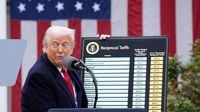As Canadians head to the polls on April 28, 2025, nearly 30 million eligible voters are set to decide the fate of their government. The parliamentary election is poised to be a pivotal moment, determining whether the Liberal Party, led by Premier Mark Carney, can maintain its decade-long hold on power or if the Conservative Party, under challenger Pierre Poilievre, can reclaim the reins after almost ten years in opposition.
This election has gained unprecedented attention, not just for its domestic implications but also due to the influence of U.S. President Donald Trump. For months, Trump has openly suggested that Canada should become the 51st state of the United States, a notion that has sparked outrage and defiance among many Canadians. His aggressive tariff policies and provocative statements have reshaped the political landscape, with the Liberal Party gaining momentum as a result.
In the lead-up to the election, polls indicated a close race, with the Liberals recently pulling ahead by four points, a significant turnaround given that the Conservatives had dominated earlier surveys. At the start of the year, Poilievre's party was leading by more than 25 percentage points, but the political tide shifted dramatically following Trump's interventions.
On the day of the election, the first polling stations opened in Newfoundland, with early reports indicating that a record 7.3 million Canadians had already cast their votes ahead of Election Day. The election is taking place across 343 constituencies, spanning six time zones, making the final results a complex affair expected to unfold over the night of April 28-29.
Trump's influence has not gone unnoticed. His comments and policies have become a dominant theme in the election discourse, overshadowing traditional concerns such as housing shortages, rising prices, and healthcare. Many Canadians are particularly concerned about the cost of living, especially young voters who are struggling with skyrocketing rents and inflation. As one worried Canadian noted, "The economy is in shambles, housing is unaffordable, and no, we do not want to be the 51st state of the USA."
In a tweet directed at Trump, Poilievre condemned the U.S. President's interference, stating, "President Trump, stay out of our election. Canada will always be proud, sovereign, and independent, and we will never become the 51st state." This sentiment reflects a growing national pride among Canadians, who have reacted to Trump's provocations with protests and boycotts of American goods.
In a recent interview with Time Magazine, Trump reiterated his stance, declaring, "We need to stop the artificially drawn borders from many years ago," and suggesting that Canada would thrive under U.S. governance. He dismissed the importance of Canadian products to the U.S. economy, claiming, "We don't need Canada for anything," which has only fueled the fire of Canadian nationalism.
As the election unfolds, the economic situation remains a pressing concern for voters. Many Canadians, particularly those aged 18 to 34, are facing financial hardships that have forced them to take on multiple jobs or incur debt to manage high living costs. The rising cost of housing has become a central issue for this demographic, who feel increasingly disenfranchised by the current political climate.
Despite the challenges, the Liberal Party's recent surge in popularity can be attributed to the backlash against Trump's rhetoric. Political analysts note that the so-called "Trump effect" has galvanized support for Carney's party, which is now seen as a bulwark against U.S. aggression. Yvonne Denz, a political analyst, stated, "About 19 percent of voters consider Trump's influence an important factor in their voting decision," highlighting the extent of his impact.
As the results start to roll in, the stakes are high for both parties. Carney, who previously served as the head of the Canadian central bank, has positioned himself as a steady hand in tumultuous times. His experience during the financial crisis and subsequent leadership roles have bolstered his credibility among voters.
On the other hand, Poilievre's populist approach and promises of tax cuts and reduced government spending have resonated with a segment of the electorate, but his association with Trump-like tactics has drawn criticism. Denz notes that while Poilievre attempts to distance himself from Trump, he still faces the challenge of being perceived as "Trump light" by his opponents.
The outcome of this election will not only shape Canada's political future but also set the tone for its relationship with the United States. As Canadians cast their votes, they are not just choosing a government; they are asserting their national identity in the face of external pressures. The world will be watching closely as the results are announced, and the implications of this election will likely resonate far beyond Canadian borders.
In summary, the April 28 election in Canada is a defining moment, influenced heavily by the specter of Donald Trump and his controversial policies. With record voter turnout expected and a close race between the Liberals and Conservatives, the results will reveal not only the political preferences of Canadians but also their resolve to maintain sovereignty in a challenging geopolitical landscape.





